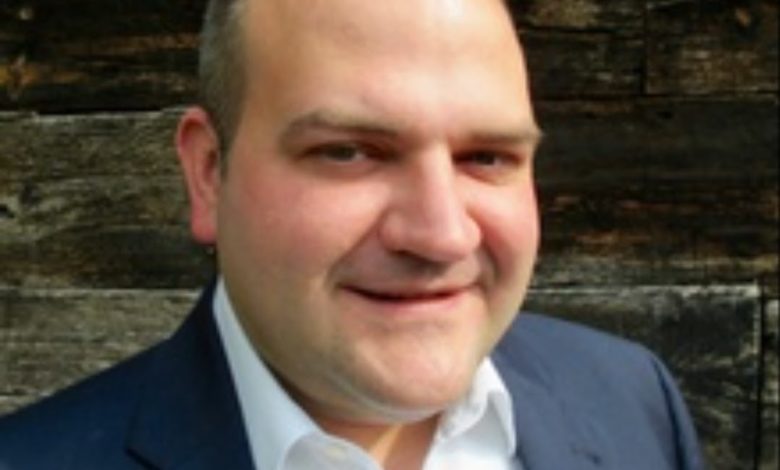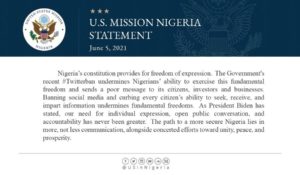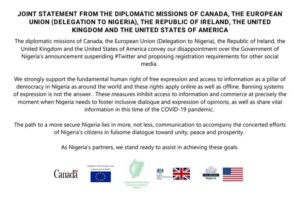Following Heavy Criticism Against Their Silence, Western Diplomats Weigh In On #TwitterBan In Nigeria
Nigeria consultant and non-resident fellow at Centre for Democracy and Development, Matthew Page was one of many who challenged Western countries to protect civic space in Nigeria.

Following criticisms over their silence on the decision of the Nigerian Government to suspend Twitter operations in the country and block Nigerians’ access to the social media platform, the United States Embassy in Nigeria has issued a statement saying the government’s recent Twitter ban sends a poor message to its citizens and undermines fundamental freedom.

Also, James Duddridge, the UK Minister of Africa, in a tweet expressed his concern.
“I am concerned that the Government of Nigeria has suspended Twitter. We hope that all Nigerians can enjoy their full rights to freedom of expression and do so responsibly,” Duddridge said.
In a Tweet on Friday, June 4, the British deputy High Commissioner in Nigeria, Gill Atkinson said “All Nigerians have the right to freedom of speech and the responsibility not to misuse that right2.
“Any action taken by the Government must be measured, proportionate and not suppress basic freedoms.”

On Saturday evening, June 5, 2021 Canada, EU, Ireland, UK and the USA, in a joint statement, expressed their disappointment over the suspension of Twitter and proposed registration for other social media.
Earlier, Matthew Page, a Nigeria consultant and non-resident fellow with the Centre for Democracy and Development in Abuja, had in a series of tweets on Saturday, expressed his dissatisfaction with some western countries’ responses to shrinking civic space in Nigeria.
Page reacted hours after the Nigerian government suspended Twitter’s operations, a vital tool for citizen participation in democratic governance.
Over the past few years, Twitter has been an essential online civic space for engagement and activism in diverse socioeconomic and political issues concerning citizens.
In 2020, Twitter, through the #EndSARS hashtag, allowed young people to galvanise themselves and hold protests against police brutality and abuse.
Page, who is also the co-author of the book Nigeria: What Everyone Needs to Know, called out the Australian High Commissioner, the United States Diplomatic mission, and European Union Delegation for their silence after the Twitter ban as Nigerian democracy slides.
He added that “for the umpteenth time, I would observe that @USinNigeria ( United States Diplomatic mission) @AsstSecStateAF (State Department Africa Bureau) and, in many instances, @UKinNigeria (British High Commission) policy toward Nigeria is broadly failing because it demonstrably does not *, in fact,* prioritise democracy and governance in the ways it purports to do”.
He lamented that both countries over-prioritise their relationships with Nigeria’s kleptocratic, incompetent, and authoritarian elites at the expense of their relationship with Nigerians at large.
“In doing so, they will be on the wrong side of history as Nigeria barrels further off course.”
” If I were a Western diplomat, I would be worried about how cynically Nigerians view international engagement. So much tone-deafness. @USinNigeria post-Lekki. @UKinNigeria photo ops with predatory/corrupt security chiefs. I don’t understand these flawed cost/benefit judgments,” Page said.
A former US intelligence community’s top Nigeria expert, Page, added that “I simply don’t understand how Western engagement with the Nigerian government is still so *normal* and thus disconnected from the way the government behaves or how its elites—with whom diplomats readily hobnob—immiserate everyday Nigerians and undermine national stability”.
He also stated that privately, Western diplomats and policymakers hope that Nigerian elites like President Buhari will change their behaviour out of concern for their legacy.
“I would argue that they should do the same. How will history remember their silence and empty hand-wringing as Nigeria’s civic space closes?”
Support Our Journalism
There are millions of ordinary people affected by conflict in Africa whose stories are missing in the mainstream media. HumAngle is determined to tell those challenging and under-reported stories, hoping that the people impacted by these conflicts will find the safety and security they deserve.
To ensure that we continue to provide public service coverage, we have a small favour to ask you. We want you to be part of our journalistic endeavour by contributing a token to us.
Your donation will further promote a robust, free, and independent media.
Donate HereStay Closer To The Stories That Matter




